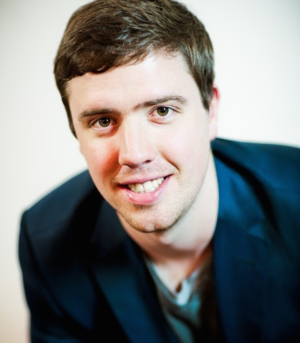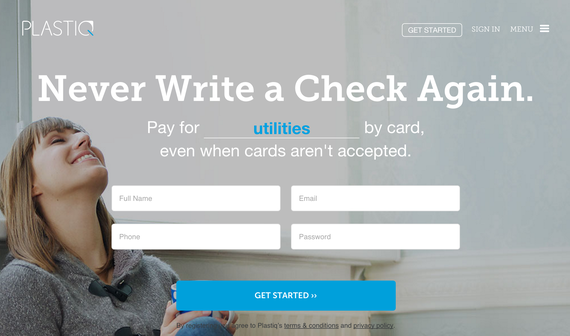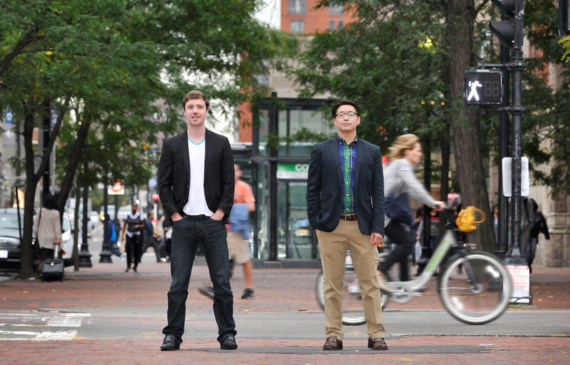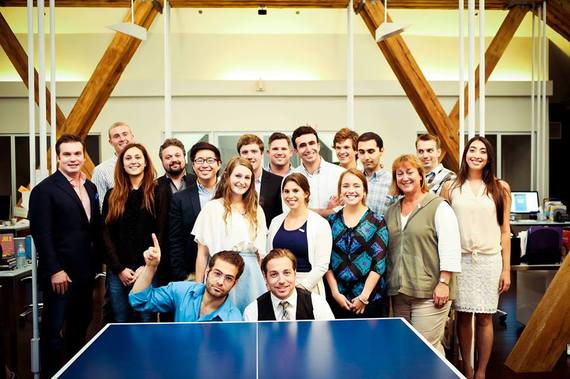This article is part of the Young & Entrepreneurial series that features young startup founders and entrepreneurs. You can see past features here. To stay up to date with future posts, sign-up here.
A lot of people say that in order to start a company, you must be knowledgeable in the space that you're trying to enter. While this is true for most entrepreneurs, sometimes, what is more important is the problem you're trying to solve. And when this problem is something you personally face, and when you realize that there isn't a solution for it yet, a startup is born. This was the case for then Harvard undergraduate student Eliot Buchanan.
Eliot was flying back from China brainstorming for business ideas after his internship got canceled, when he received his last tuition bill from Harvard. Eliot then asked himself, 'why can't I pay my tuition bill with a credit card?' Due to a technicality, these types of life payments don't accept credit card payments. Eliot wanted to change this.
This would lead to the birth of Plastiq, an online platform that allows consumers to use their credit cards for payments in situations when they previously could not. Some of these payments include paying for tuition, taxes, utilities, rent and more.
Eliot shared, "I spent my entire senior year in Harvard getting to know the industry, meeting people, meeting my cofounder and gathering data and information." This was back in 2011. Five years later, Plastiq has gone on to raise over $18M in venture funding, processing millions of payments each year.
Building Credibility as Student Entrepreneurs
One of the biggest challenges Eliot faced initially in trying to start Plastiq was establishing credibility when he was trying to secure their first few partnerships with big banks. How did he overcome this?
He shared, "You have to get to know the right people. A lot of times, trust is how they get to know you but as a first time entrepreneurs, you don't' really have any credibility so how can they trust you? A lot of times, you have to start out by building what I call credibly by association, which is associating yourself with really smart and credible people who other people will trust."
Eliot then expounded talking about how they landed their first major partnership with MasterCard, and how securing this first partnership took a lot of social capital and finding a way to get the executives and higher ups to endorse the idea.
He shared, "The MVP, the website wasn't the prettiest and it wasn't always functioning, but the messaging was clear. It wasn't a future solution like Bitcoin but it was a technology that solved a real pain point everyday that they could use. There was real applicability which really resonated with these partners."
Meeting with MasterCard's Global CEO
Networking would be the name of the game for Eliot in finding a way to get connected to top executives for these potential partnerships. While Eliot was still in Harvard, he had been exploring the 2 + 2 program were you could graduate from Harvard, work in the industry then go to the business school.
Eliot shared, "Here was a new dean at the Harvard business School named Nitin Nohria and at that time, he was a big champion of this program and entrepreneurship in general and I was lucky enough to get an intro from him and as I talked to him about our business, he happened to know a gentleman named Ajay Banga. Ajay was the global CEO of Mastercard and Nitin kindly heard my story, offered to make an introduction and before I knew it, I was connected to Ajay of Mastercard."
Just like that, and Plastiq had its first partner bank.
Getting the First 1000 Users
Eliot emphasized how at the start you really have to put the manual effort into it. He shared, "Do unscalable things. You know, in my case, think about the industries we serve, taxes, tuition and utilities. I looked at my network and think about people who had to make these payments then I would reach out to them and ask them to try our service."
Eliot also tried other things like going to restaurants and cafes and randomly talking to people to get their feedback. He shared, "I think you have to be extremely aggressive and do things that may not be scalable because the point is to get really fast and early feedback."
However, it wasn't until Eliot and his cofounder Daniel Choi had graduated from college when they saw that this was worth pursuing with more and more users signing up for their platform.
Official Launch in Canada
The Plastiq team would decide to make their official launch in Canada after speaking with their partner banks. This allowed them to launch quicker with a lot of the banks preferring that the Canadian market be the testing ground for Plastiq.
Eliot shared, "What's beautiful is that the banks get revenue from every transaction so by us facilitating new transactions on their card, they're already earning and gaining from that."
Now that Canada is growing organically at a steady rate, Eliot and the rest of the Plastiq team has shifted their focus in growing their US presence, even moving their office to San Francisco to focus on growth. Eliot shared, "We're a consumer brand. A lot of the partnership around growth and a lot of talent we need to hire around growth are in San Francisco."
A big part about Plastiq is that they revolve around life payments that people will continue to have. Eliot added, "People still pay tuition, they still pay taxes, they will still buy houses and cars in the next 5, 10, 15 years. We want to be the single channel where people come when they have to make these important payments."
Advice to Student Entrepreneurs
Asked what advice he would give to student entrepreneurs, Eliot emphasized the importance of just getting started and taking action. He shared, "I think starting is the hardest part because once you're in, you know what its like. You're knee deep in the craziness of startups and quickly you can make or break or what have you. People don't start because they think they need money or they need to know certain things or they can't do this or that. But 99 percent of the time, you don't."
He added, "You can actually do things in a less scalable and less expensive ways to get started. People don't start early but my advice is to just start because you'll screw up much sooner, you'll ask questions much sooner, you'll have more attempts more quickly."
Eliot also encourages students to just make the most out of the resources their University offers and try to learn from others. He shared, "I'm a face to face guy. I would just knock on the door, and I would meet a lot of interesting people, professors, students, graduate students and visiting speakers. I would just talk to them and ask them about their experiences, what did they do wrong, what did they do right and that's where I got most of my early knowledge."
You can learn more about Plastiq in their website here.
--- About the author ---
David Ongchoco is a student entrepreneur and avid storyteller from the Philippines studying at the University of Pennsylvania majoring in what he likes to call, LIFE. He is currently working on expanding his for-purpose organization YouthHack. It's David's goal to make an impact in the lives of as many people possible while constantly learning new things every single day. If you have any interesting startup stories, David can be reached via Twitter @DOitChoco.



